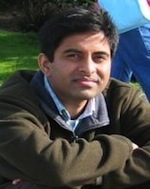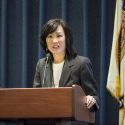UW-Madison chosen for federally funded cloud computing research
Cloud computing, which allows users of technology to tap into remote, shared infrastructure and services, is a major facet of today’s world. Whether or not we realize it, countless aspects of our daily lives — from social media to drug discovery — are now enabled by cloud computing.
The University of Wisconsin–Madison has been chosen to be part of a National Science Foundation-funded project called CloudLab — a joint effort of university and industry teams for the development of cloud infrastructure and fostering the high-level research that it supports.
CloudLab will enable researchers in core areas of computer science — including networking, storage and security — to evaluate novel cloud technologies in a realistic environment. This experimentation will fuel innovation in new computing technologies that will power next-generation cloud systems.
NSF has awarded $10 million for CloudLab. UW–Madison’s share is $2.3 million. The funds will be used to establish and operate large-scale data centers at each of three CloudLab campuses (UW-Madison, the University of Utah and Clemson University). The three centers will be interconnected to form a unique laboratory for experimental computer science research.

Aditya Akella
On the Madison campus, computer sciences professors Aditya Akella and Remzi Arpaci-Dusseau will serve as co-principal investigators. Larry Landweber, professor emeritus of computer sciences, will serve as a consultant to the project. Miron Livny, professor of computer sciences, will serve as the liaison to the growing community of researchers who depend on cloud resources for their science.

Remzi Arpaci-Dusseau
CloudLab will serve as a testing ground for a UW–Madison research institute called WISDOM, in which Akella, Arpaci-Dusseau and many other computer sciences faculty participate. WISDOM focuses on the software that will drive next-generation data centers.
Researchers across campus — and across the country — will also conduct research using CloudLab. “There is great promise in medicine, genetics, physics, transportation and more,” says Landweber.
“As cloud resources play an increasing role in supporting the High Throughput Computing needs of the Open Science Grid consortium,” says Livny, “we are looking forward to using the unique capabilities of CloudLab to evaluate new tools and methodologies.”
Akella explains the pervasiveness of cloud computing: “Almost all major services we depend on today rely on cloud computing. Our digital and physical lives are increasingly shaped by modern-day clouds.”
Cloud computing represents “an amazing transfer of infrastructure” from users themselves to vast, remote networks, says Arpaci-Dusseau. Even the streaming-video giant Netflix does not maintain its own data center, choosing instead to go through Amazon Web Services. Similar services are offered by Google, Microsoft and smaller companies.
“In turn, these innovations will lead to exciting new services that are simply impossible to realize on clouds today.”
Aditya Akella
Each of the three NSF-funded data centers will be affiliated with a different company that will consult on the center’s design and implementation. This will provide researchers using the data centers with a diversity of vendors and designs. UW’s center will be connected to Cisco Systems Inc. and is expected to house 4,000 to 5,000 CPUs.
“Cisco’s scientific relationship with UW goes back to late ‘90s and includes earlier endeavors in areas like large-scale network labs and software-defined networking,” says David Ward, Cisco senior vice president. “CloudLab represents a productive collaboration between private industry and a world-class research university. Cisco looks forward to working with UW’s team to build future data-center architectures, creating new service opportunities.”
“CloudLab will enable the next generation of innovations in the entire cloud ecosystem, ranging all the way from hardware elements, to software infrastructures, to the applications that run on the clouds,” says Akella. “In turn, these innovations will lead to exciting new services that are simply impossible to realize on clouds today, benefitting our economy and society at large.”
UW-Madison’s chief information officer, Bruce Maas, notes that the project will not only help researchers nationwide, but also offer benefits for the UW itself. “CloudLab represents a new, important tool available to our staff members who support advanced computing infrastructure. This will give them cutting-edge experiences that can also be used to support research computing at the UW.”
—Jennifer A. Smith
Tags: computers, research, technology


